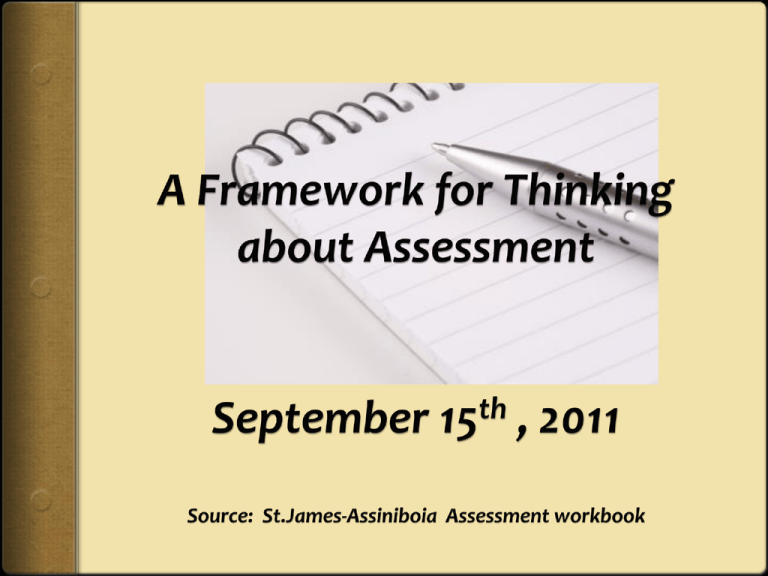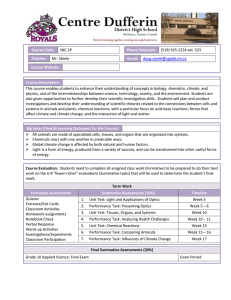Document 15349910
advertisement

What do you think? The most effective method for assessing my students is to use a large end of unit test. Students have varied learning needs. Students learn in different ways, so teachers could invite students to demonstrate their learning using various assessment tools: Authentic tasks Projects, Research, Technology Performances Conversations, explanations Portfolios, E-portfolios Student designed projects Quizzes or Tests What do you think? I don’t have time to use formative assessments. They are not important. The only learning evidence that I need to gather is at the end of a unit of study. This is the best time to find out what my students know and can do. Rick Wormeli Video It depends. How will you be using the information? If students will be given the opportunity to improve their learning, then the assessment is formative. This form of assessment is ongoing, descriptive, timely & shows where the student did well and what needs to be adjusted. If you are gathering this information to inform your instruction to plan for the next steps in learning then the assessment is formative. Formative assessments are used to inform students about their own personal learning. If you are collecting information to report on what a student knows, understands and can do at the end of a learning block, then it is a summative assessment. Intended summative assessments can also be used as formative assessments if the evidence clearly shows that students have not achieved the intended learning outcomes. Summative assessments are used to inform others about students progress, & students about themselves. What do you think? When I plan lessons, I should start with the end in mind. Planning with the end in mind gives you a clear understanding of what you want your students to Know, Understand, and Do at the end of the teaching/learning process. Identify desired results Determine acceptable evidence Plan learning experiences & instruction What do you think? I do not need to worry about involving my students in coconstructing the criteria for success. That is the work of the teacher. By allowing students to be participants in creating the criteria, students become a part of the assessment process. Students are clearly aware of the learning outcomes and expectations of the teacher. Students will be able to “see” what the end result needs to look like. Getting students involved with setting success criteria eliminates the chance for any surprises… It creates a tool for students to use for self assessment. What do you think? Students learn best after a test has been graded. They can then see the mistakes they have made, make corrections so they will not make the same mistakes again. It Depends… Students can only learn from their graded work if they are given opportunities for revision, with teacher descriptive feedback. Feedback should be descriptive so that students understand what they need to do to improve. Students should become effective at self assessing so that they know where they are, and what they need to do to get to the “end.” What do you think? If I allow students to self-assess it will appear as though I am not doing my job. I should see every piece of work at every stage of its development. Self assessment allows students to take ownership of their performance based on the established criteria. The teacher’s role is critical for an effective self- assessment process. Self-assessment promotes the development of independent learners. Students need to be given opportunities to reflect upon their own learning. What do you think? If a student does not hand in assigned work, I will give them a grade of zero…every time. Reporting Report Card grades are based on: Achievement of outcomes and standards Multiple and varied opportunities to demonstrate achievement Most consistent performance Special consideration for the more recent information…not necessarily an average What do you think? I must include all formative and summative assessment results in my reporting of student achievement. Everything does not have to be included in the “reported” grade. It is reasonable to negate a mark if the student has demonstrated the learning outcome consistently at a different point in time. Most recent evidence of learning completely replaces out-of-date evidence for a particular learning outcome when it is reasonable to do so. What do you think? If the parents of my students are well informed about learning outcomes and how their child is progressing, there is less of a chance of “surprises” and angry phone calls from parents. DEFINITELY! Be sure to speak in student & parent friendly language, always. Summary: When assessing students, make sure : Assessments relate to the learning outcomes Assessments are criteriareferenced Grades are based on individual achievement-not on behaviour. Records are easy to be updated. You aren’t just an “accountant”consider the whole picture. To use quality assessments. Students are involved in the assessment process. Thank you! Teachers Make a Difference From: Julie & Dianne

